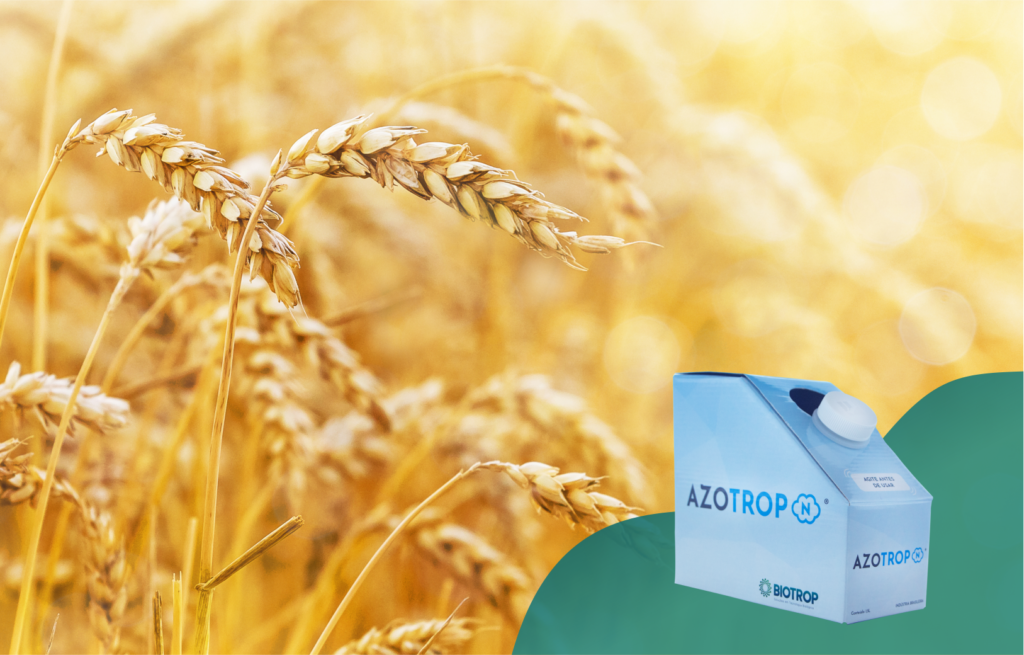Azotrop – liquid and peat inoculant for soybeans, beans, corn, wheat and pasture.
In the past few years, Brazil has stood out internationally as one of the largest producers of grains, especially corn and soybeans. This crop year, for instance, according to CONAB, it is expected a harvest of more than 251.9 million tonnes. However, for some basic agricultural commodities for the population, such as wheat, the national production is still insufficient.
Brazil consumes around 10 million tonnes of wheat annually. However, in the two past crop years, only half of it was produced. Based on this scenario, Brazil relies on other countries, especially from Mercosul, and more recently on the USA, which, in times of market volatility, makes Brazil more vulnerable.
In order to increase wheat productivity and profitability per hectare, Azotrop (Azospirillum brasilense) is available on the market. This inoculant is the result of innovation, research and development of an alliance between EMBRAPA and BIOTROP, a company that develops biological and natural solutions for agriculture.
Regarding its differentiating factors, in addition to increased productivity, we can also mention increased root growth and biological nitrogen fixation, and improved water and nutrient absorption. The product also enhances plant structure, reducing lodging. “Azotrop enables plants to develop better, resulting in healthier, more resistant, and more productive plants”, points out Fabio Scudeler, BIOTROP’s innovation and technology manager.
Proven results
Tests recently carried out showed the efficiency of the product on two farms in Itaberá, SP. In the first case, Azotrop was applied on a 12-hectare area. It was observed the development of 162 tillers per linear meter in the control field, while it was observed 201 tillers per linear meter where Azotrop was applied – an increase of 24%.
Increases in productivity were analyzed on the same farm. While the standard area of the farm reached 72sc/ha, the farmer achieved 83sc/ha by using Azotrop, that is, an increase of 15.7%, which means 11 more sacas (1saca = 60kg) per hectare. If we consider an average of R$55 per saca, the additional gain was R$605 per hectare.
On the second farm, the results achieved by using Azotrop were also expressive. In this case, the product was applied on an area of approximately 15 hectares. Considering the number of tillers per linear meter, the control area reached 182. The area where Azotrop was applied reached 234 tillers, which consisted in an increase of 28%.
Regarding productivity, Azotrop also resulted in benefits to the farmer. While the control area reached 43sc/ha, the area on which BIOTROP’s product was applied had an increase of 21%, that is, 52sc/ha. Considering the same average cost of R$55 per saca, there was an increase of R$ 495/ha. “There are many results that prove the efficiency of our product. Nitrogen use combined with the ability of producing phytohormones allow plants to uptake nutrients in the soil in a more efficient way”, highlights Scudeler.
Search for quality
Currently, a large amount of the wheat grown in Brazil is intended for the production of bran for livestock feeding. One of the factors that contributes to that is the limited quality of grains grown in Brazil, which do not achieve an ideal standard required by the bread segment, which best pays growers.
According to Ricardo Silva Araujo, agricultural engineer and plant pathology/bacteriology Ph.D., there is a lack of investment in studies on how to improve grain production mainly because high quality levels and production potential cannot be reached. “The most important problem that I see is the low value. It is a commodity that is not attractive because there is no quality, therefore the country has to rely on importing wheat from Argentina for the bread segment and a series of other industrial applications that require gluten”, highlights the expert.
Still according to him, in order to improve grain quality, BIOTROP has invested in studies on the quality of wheat with Azospirillum sp, which will be interesting. “New tests will be carried out by using wheat varieties developed for flour production, so we will be able to observe the effect of Azotrop on the bromatological quality of grains. That is the only way to cause a revolution in a commodity that is still not important in Brazil. This directed study will allow us to rely less on importation”, he concludes.
Source: Agrolink

